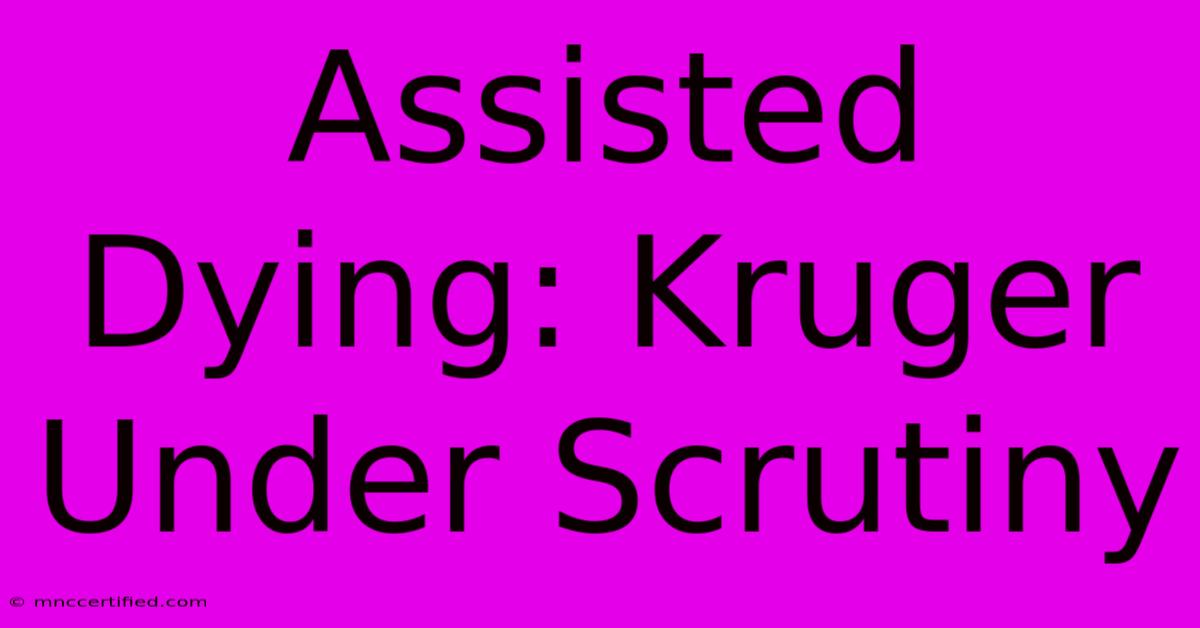Assisted Dying: Kruger Under Scrutiny

Table of Contents
Assisted Dying: Kruger Under Scrutiny
The recent case involving Dr. Mark Kruger has thrust the complex and highly sensitive issue of assisted dying back into the public spotlight. While the specifics of Dr. Kruger's situation remain subject to legal proceedings, the case serves as a crucial opportunity to re-examine the ethical, legal, and societal implications of assisted dying, often referred to as physician-assisted suicide (PAS) or euthanasia. This article will delve into the key aspects of the Kruger case, exploring the arguments for and against assisted dying, and examining the broader context of end-of-life care.
The Kruger Case: A Summary of the Allegations
(Note: Due to the ongoing legal proceedings, specific details about the Kruger case should be obtained from reliable news sources and court documents. This article will avoid speculating on the specifics of the accusations to maintain accuracy and avoid prejudicing the case.)
The core issue in the Kruger case appears to center around allegations related to his involvement in the death of a patient. Understanding the precise nature of these allegations is crucial to evaluating the ethical and legal considerations. Media reports suggest a potential violation of existing laws regarding assisted dying, highlighting the precarious legal landscape surrounding this sensitive topic.
Assisted Dying: A Moral and Ethical Minefield
The debate surrounding assisted dying is deeply rooted in moral and ethical philosophy. Arguments in favor frequently cite autonomy and dignity. Proponents argue individuals facing unbearable suffering and a terminal illness should have the right to choose how and when their life ends. This aligns with a broader emphasis on patient autonomy in healthcare decision-making.
Conversely, opponents often raise concerns about the sanctity of life, arguing that taking a life, even with consent, is inherently wrong. Ethical dilemmas also arise concerning the potential for abuse, coercion, and the possibility of assisted dying being used inappropriately for individuals who might be experiencing treatable depression or other conditions that could improve with appropriate care. The question of vulnerable populations, such as the elderly or those with disabilities, also adds a layer of complexity, prompting fears of undue influence or pressure.
The Slippery Slope Argument
A common argument against legalizing assisted dying is the "slippery slope" concern. Opponents fear that allowing assisted dying in specific cases could lead to a broader acceptance of euthanasia, potentially extending to individuals who are not terminally ill or who lack the capacity to make informed decisions.
Legal Frameworks and International Perspectives
The legality of assisted dying varies significantly across the globe. Some countries have legalized it under strict regulations, while others maintain absolute prohibitions. Even within countries where it's legal, the specific criteria for eligibility and the procedures involved differ considerably. Understanding these international variations provides important context for analyzing the Kruger case within a broader legal framework.
The Role of Palliative Care
The debate over assisted dying is often framed in opposition to the provision of comprehensive palliative care. However, proponents of both perspectives largely agree that adequate palliative care should be available to all patients facing terminal illness. Palliative care focuses on alleviating pain and suffering, improving quality of life, and providing emotional and spiritual support. While not a direct substitute for assisted dying, the availability of high-quality palliative care can significantly impact the discussion by reducing the number of individuals who feel assisted dying is their only option.
Conclusion: A Necessary Conversation
The Kruger case, regardless of its outcome, underscores the urgency of a continued, nuanced, and respectful conversation about assisted dying. It requires careful consideration of the ethical implications, legal complexities, and the availability of alternative end-of-life care options. Open dialogue, informed by evidence and ethical frameworks, is essential to navigate this challenging issue and develop policies that protect both individual autonomy and the sanctity of life. It is crucial to ensure that discussions surrounding assisted dying are conducted with sensitivity, acknowledging the deeply personal experiences and beliefs of those involved. Further research and public education are necessary to foster a more informed and compassionate approach to this complex issue.

Thank you for visiting our website wich cover about Assisted Dying: Kruger Under Scrutiny. We hope the information provided has been useful to you. Feel free to contact us if you have any questions or need further assistance. See you next time and dont miss to bookmark.
Featured Posts
-
2024 Macys Thanksgiving Parade How To Watch
Nov 29, 2024
-
How Does Fleet Insurance Work
Nov 29, 2024
-
Gib Vs Slim Fight Winner Misfits 19
Nov 29, 2024
-
Eras Tour Book Vinyl Swift Fans At Target
Nov 29, 2024
-
Tv Star Mulhern Hospitalized Following Collapse
Nov 29, 2024